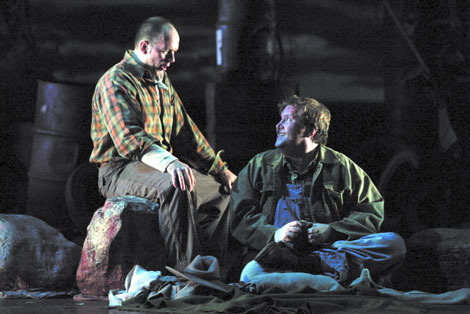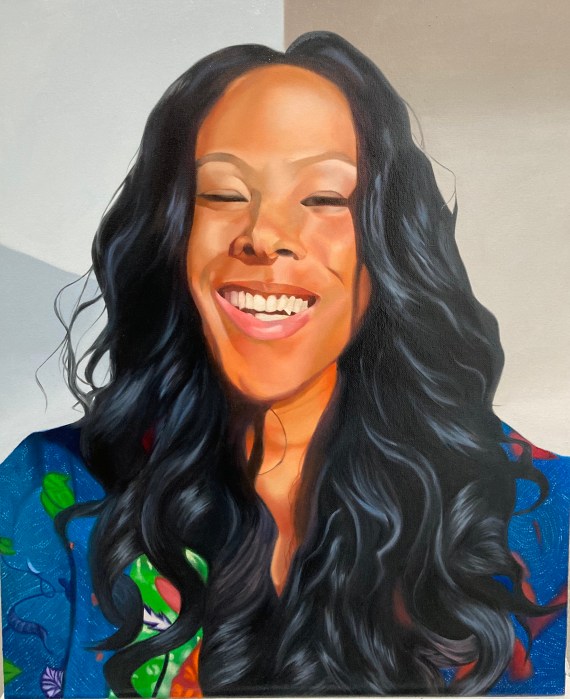Operas in English, for a (welcome) change
At least implicitly a response to McCarthy-era demands for conformity, Carlisle Floyd’s melodic, well-wrought “Susannah” (1955) retains its impact in an American climate mistrustful of sexuality.
The week it opened at Opera Company of Philadelphia, Pres. George W. Bush’s handlers had him proclaim an official “Marriage Protection Week.” Coincidentally or not, opening night (October 11) a small band of fundamentalist loonies roamed the city’s gay neighborhood—two blocks from the opera house—with signs denouncing sodomy and extramarital sex.
OCP did very creditably by Floyd’s affecting work. Mary Mills, new hereabouts, made a very appealing heroine, tracing Susannah’s odyssey from girlish innocence to bitter hostility convincingly. Her clear soprano proved a shade light for her two arias, but she handled both with skill. David Pittsinger’s Rev. Olin Blitch, looking and sounding good, was more convincing at seducing Susannah than in his big church scene, where only larger-than-life presence and vocalism will do. Jay Hunter Morris’ clear projection and skilled acting made for a strong Sam.
Other standouts were Curtis Institute’s superb young contralto Meredith Arwady (Mrs. Ott) and powerful tenor Jason Collins (Elder Glenton). Stewart Robertson made a highly welcome company bow in the pit. Robert P. Driver staged the show straightforwardly in Paul Shortt’s spare but gorgeously evocative set. The 77-year old composer enjoyed deserved cheers at curtain call.
City Opera revived Rhoda Levine’s shattering production of Floyd’s “Of Mice and Men” (1970), staged vividly by Andrew Chown. Seen October 18, this showed the company at its finest, giving an arresting theatrical presentation of what if anything is an even better-constructed and -scored work than “Susannah.” Floyd has always written his own libretti and what he crafted from Steinbeck’s novel holds the stage very well. Moreover, in giving the iconic character of Curley’s Wife her own impossible dreams of Holywood to set by the heroes’ dream of a home, it avoids the possible misogyny of making her merely an evil spoiler. Has anyone explored the homosocial aspects of Steinbeck’s material?
The musical idiom is conservative but never unsophisticated, and it suits the material as profoundly as do John Conklin’s Walker Evans-meets-Ansel Adams sets, stunningly lit by Robert Wierzel. Anthony Dean Griffey’s Lennie has been justly lauded; he acts with ideal simplicity and sings with excellent diction in a clear, beautiful tone. Rod Nelman gives a sympathetic, decent performance as George but doesn’t make his words clear enough or audibly wield the leading “American baritone” sound implicit in the sometimes soaring music. What has happened to this kind of sturdy-voiced singer, serving both American opera and musical comedy so well?
The Broadway archetypes of Alfred Drake and John Raitt were paralleled in the opera house (and more than occasionally on Broadway itself) by Robert Weede, Walter Cassel, Chester Ludgin, William Chapman, and George’s creator, Julian Patrick, an excellent singing actor who never really got his due in New York. Mark Delavan or Timothy Noble could sing George superbly, but neither has (as Nelman does) the slight, insignificant physique needed to contrast with the outsized child-man Lennie.
The ensemble was remarkably strong; even the performer in the smallest role (Marvin Lowe as Johnson) established himself as a defined presence in the bunkhouse. As Curley, Joel Sorensen, singing well in a (vocally) not very rewarding part, was credibly hot-tempered and vicious but sexy enough to make it understandable that he caught the eye of his rather predatory blonde Wife (she remains pointedly unnamed). Nancy Allen Lundy sang and embodied this tough part with considerable skill and dynamic variety. Marcus De Loach, with a cultivated lyric baritone, gave the role of the dreamer Slim exceptional profile; he’s clearly a performer who relishes singing expressively in his native language and is at ease onstage. Robert Mack (Ballad Singer) and Peter Strummer (Candy) also offered well-sung, fully fleshed out characterizations.
Much credit for the performance’s excellence goes to the assured hands of Willie Anthony Waters (the general and artistic director of Connecticut Opera) in the pit. The final performance of “Of Mice and Men” will be Halloween Night, with the very promising young Paul Mow stepping in as Lennie. Not a show to miss.
Neither, I find myself writing somewhat to my own surprise, is Jonathan Miller’s highly stylized 20s fling at “The Mikado,” in the City Opera repertory until November 21. As one raised on Gilbert and Sullivan (my very first City Opera performance, at age five, was indeed “The Mikado” with the great Claramae Turner as Katisha), I’ve avoided the operettas for years because I don’t care for the mannered and “refayned” style in which they are almost always performed. Nor does the prospect of Caucasian performers affecting “stage Japanese” mannerisms sit well these days.
Miller sagely tosses all thought of Japan out the door, setting the show at what looks to be a swank hotel in the Isle of Wight, and concentrates on Gilbert’s parody of bureaucracy and form for its own sake. Though his misogyny in regard to Katisha and other older women characters is irredeemable, many of the lyrics retain their surprise and delight. What one tends to forget about the G & S shows—beyond the catchy melodic hooks in the “point numbers”—is the outright gorgeousness of some of Gilbert’s music.
Fortunately, NYCO has cast people who can really sing numbers like the Handelian “See how the fates their gifts allot.” Anna Christy, certainly earning her name as Yum-Yum, sings a lovely “The sun whose rays,” and Keith Jameson (who goes from strength to strength with the company) has the grace and charm Nanki-Poo needs (plus sterling diction). Though British accents come and go, the other featured principals––Edith Dowd (Pitti-Sing), Kyle Pfortmuller (Pish Tush), Gregory Reinhart (Poo Bah) and Jan Opalach (Mikado)––all perform well, with voice and style to burn. Myrna Paris, as ever a brilliant comedienne, does not seem to be in top form vocally for Katisha. Richard Suart, who specializes in the G & S “principal comedian” parts worldwide, hams outrageously as Ko-Ko, in a manner to make Archie Rice blush; editing would help, but he’s pretty funny much of the time.
The energetic dancing extras certainly merit their applause. Stefanos Lazaridis fantastical black-and-white stage is brilliant, as are Sue Blane’s costumes. The overture (not by Sullivan anyway) sounded a little underrehearsed October 22, but after that Gerald Steichen led a good show. “Good show!,” indeed.
David Shengold (shengold@yahoo.com) writes for Playbill, Time Out New York, Opera and Opera News.


































